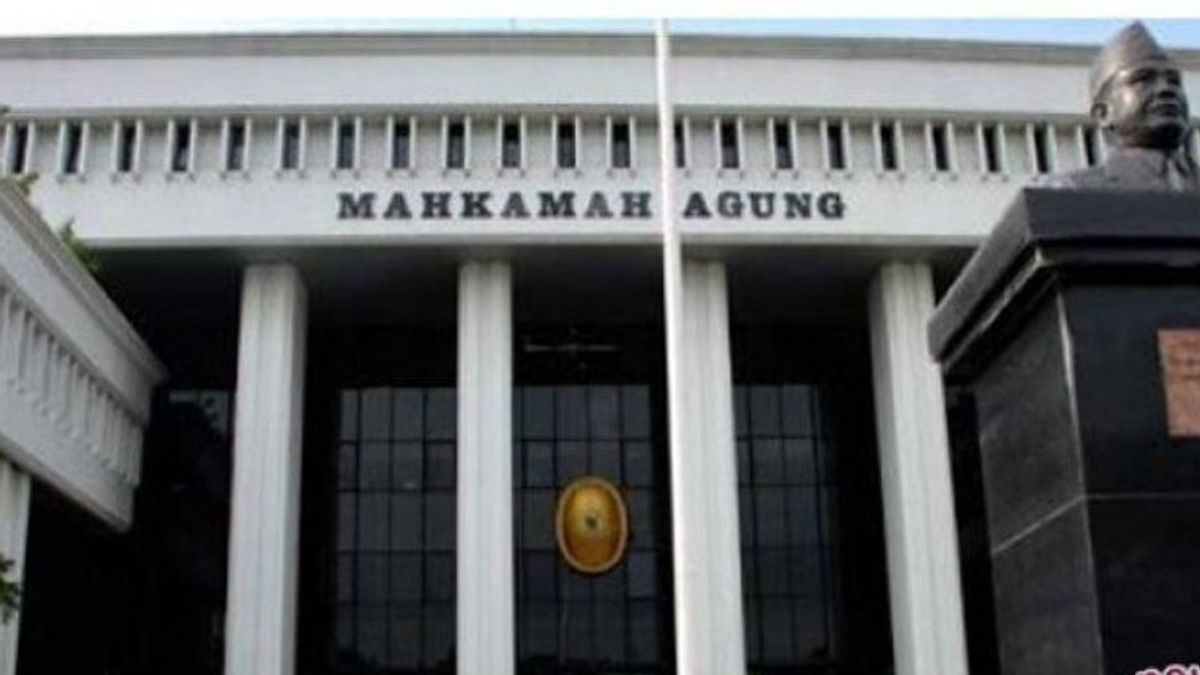JAKARTA - The Supreme Court (MA) revoked and canceled Government Regulation (PP) Number 99 of 2012 concerning the Terms and Procedures for the Implementation of the Rights of Correctional Inmates.
This revocation is the result of a decision from a judicial review or judicial review which was knocked by the Chairman of the Supandi Assembly, which consists of Yodi Martono W and Is Sudaryono. Meanwhile, the parties who proposed this material test were Subowo and his friends.
"They are former village heads and inmates who are currently serving prison terms at the Class IA Sukamiskin Prison, Bandung," said the Supreme Court's decision on Friday, October 29.
The decision stated that there were a number of reasons the panel of judges revoked the regulation. First, they stated that the function of punishment is no longer just to imprison perpetrators to be a deterrent but as an effort to rehabilitation and social reintegration in line with the restorative justice model.
Second, the panel of judges is of the opinion that prisoners are not only objects but also subjects who make mistakes which can be subject to criminal sanctions.
"So they don't have to be eradicated but what must be eradicated are the factors that cause prisoners to do things that are against the law," said the judge.
So, reflecting on that philosophy, the formulation of norms in the implementing rules of Law Number 12 of 1995 as implementing technical rules must have a spirit that is in line with the philosophy of correctionalism that strengthens rehabilitation and social reintegration as well as the concept of restorative justice.
In this regard, the Supreme Court is of the opinion that the right to obtain remission must be granted without exception or applies equally to all inmates to obtain their rights unless revoked based on a court decision.
On the other hand, the requirement to obtain remission must not be discriminatory and may actually shift the concept of rehabilitation and social reintegration that has been established and must consider the impact of being overcrowded in prisons.
"Additional conditions other than the basic requirements to be able to be granted remission to prisoners, should be more accurately constructed as a form (reward) in the form of granting additional remission rights beyond the legal rights that have been granted," reads the verdict.
"Because all the legal facts that occurred at the trial, including the defendant who did not want to honestly admit his actions and the involvement of other parties were taken into consideration by the judge in making decisions that would burden the criminal sentence," added the judge.
The authority to grant remissions becomes the full authority of the correctional institution which has the task of providing guidance to prisoners and cannot be intervened by other institutions.
This cancellation was then responded to by the Directorate General of Corrections of the Ministry of Law and Human Rights (Kemenkumham). The Head of Public Relations and Protocol of the Ministry of Law and Human Rights, Rika Apriani, said that his party was ready to follow the results of the material test.
"Further developments with what was conveyed by the Supreme Court, yes, we will follow it based on new rules or new regulations. We will definitely follow it," he said.
Even so, he ensured that the granting of remissions for prisoners, especially in special crimes such as corruption, terrorism, and narcotics was still in accordance with PP 99 of 2012.
"These rights have a basis, there is a legal standing, which is indeed a corruption case. The basis for granting the remission is PP 99 of 2012," said Rika.
"So everything is indeed granting rights based on regulations. We will see if there is a change from this PP but for sure we are still giving remissions based on PP 99 of 2012 for corruption cases," he added.
Meanwhile, the Corruption Eradication Commission (KPK) granting remissions to corruptors must consider the sense of justice for the community. Moreover, the punishment for stealing people's money should be able to provide a deterrent effect so that it does not happen again.
"We hope that the granting of remissions for the perpetrators of extraordinary crimes still takes into account the community's sense of justice and input from law enforcement officers," said Acting KPK Spokesperson for Enforcement Sector Ali Fikri.
In addition, the anti-corruption commission also reminded all parties to be committed to eradicating corruption without exception so that the practice of racism does not continue to be repeated.
"Successful eradication of corruption requires our commitment and efforts together, all stakeholders. Both the government, policy makers, judiciary, law enforcement officers, and all elements of society," said Ali.
"Because in principle, eradicating corruption is an integrated effort between enforcement, prevention and education," he concluded.
The English, Chinese, Japanese, Arabic, and French versions are automatically generated by the AI. So there may still be inaccuracies in translating, please always see Indonesian as our main language. (system supported by DigitalSiber.id)








